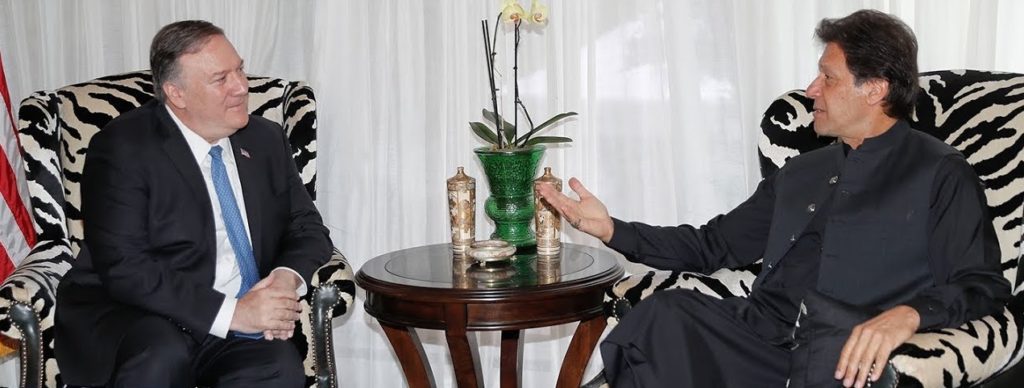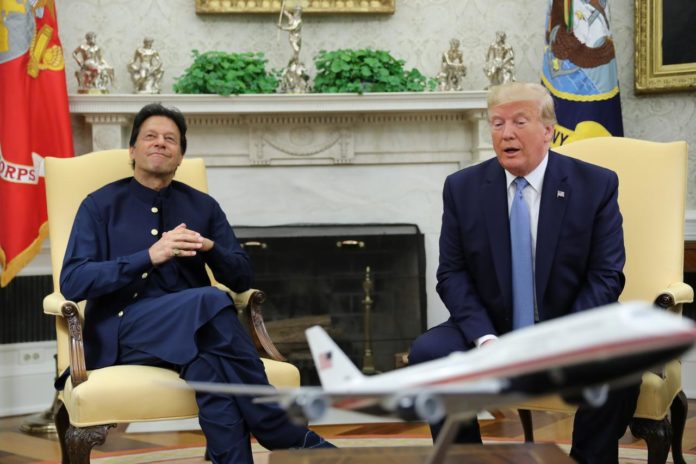The recent visit of Prime Minister Imran Khan to the United States has added a new chapter in the history of Pak-US relations. This first three-day visit of the newly elected Prime Minster of Pakistan was aimed at improving bilateral connection with Washington. Prime Minister Khan was determined to cover various aspects of regional and extra-regional politics. The meeting of Khan with President Trump was a bilateral endeavour to overhaul the traditional Pak-US diplomatic estrangement as the two leaders were agreed to change the course of history by resuming their cooperative economic and strategic connections. It was an important meeting between leaders who share a common vision of structuring non-traditional politics moves. Both leaders believe in leaving the conventional political patterns of their countries and departing from traditional political visions of their nations. The governments of Imran Khan and Donald Trump introduced various non-traditional initiatives. President Trump announced his vision of Making American Great whereas Prime Minister Imran Khan declared his vision of restoring the state of Medina. Apart from domestic politics, both Khan and Trump promised to improve the foreign relations of their respective countries. In this way, a shared worldview of global politics cemented in their exceptional political standings made the Khan-Trump meeting a successful venture. The heads of both governments proved their political potential by agreeing on various issues of international importance.
The meeting demonstrated a major shock for the Indian government where Modi was re-elected by strictly following an anti-Pakistan policy. The points of discussion between Imran Khan and Donald Trump revolved around improvement of Washington-Islamabad relations, peace process in Afghanistan and Pakistan’s counter-terrorism efforts. Moreover, Trump and Khan showed willingness to have decisive peace talks with Taliban. In this way, this visit became a turning point in the diplomatic history of two countries and the governments from both sides showed their determination for enhancing cooperation on different issues. Imran Khan’s way of managing foreign affairs proved to be an appropriate step at the time when neighbouring rival India is committed to isolate Pakistan in the international community.
The dream of maintaining a peaceful South Asia is still an unanswered question and remained an unaddressed feature of Khan-Trump meeting. President Trump and Prime Minister Imran Khan showed their consensus on bring peace, stability, and economic prosperity in the nuclearized subcontinent by managing various security issues. Prime Minister Khan conveyed his attention of upholding a policy of peaceful neighbourhood which can play a vital role in resolving conflicted issues in a conducive environment. In this meeting, the formation of different productive initiatives through dialogues considered to be an appropriate measure which could not ensure the vision of peace in South Asia but it will promote prosperity in the world beyond South Asian region. A combined vision of two leaders became a landmark development in the history of US-South Asian relations because Washington and Islamabad decided to uphold the goal of creating a peaceful South Asia. Therefore, the visit of Imran Khan (July 21-23, 2009) proved to an appreciable step in Pak-US bilateral relations, but the success of this visit is linked to the American role in the South Asian political affairs where the two neighbouring rivals have multifaceted inflexible standings. South Asian security environment in the presence of nuclear weapon capabilities of New Delhi and Islamabad is an undeniable reality of contemporary world. An unending strategic competition between India and Pakistan is the actual challenge for the United States on one hand. On the other hand, the formation of cooperative ties with Pakistan in the presence of close strategic partnership with India is another serious challenge for the United States. In other words, the Khan-Trump interaction equivalent to Modi-Trump nexus is an anxious point for Islamabad. The Indian factor always remained a basic hurdle in establishing pleasant Pak-US relations. Leading state officials from Washington and Islamabad have taken several steps for the improvement of their bilateral relations throughout history.
The diplomatic record of Pakistan and US contains countless evidences when leaders from both sides showed their willingness for constructing durable bilateral cooperation. The efforts of Washington and Islamabad were always victimised by New Delhi because the Indian leaders always preferred to create close relations with the extra-regional powers. New Delhi strongly believes the support of outsiders can help India in achieving of its regional hegemonic designs. Therefore, the Hindu leaders from New Delhi decided to develop strong strategic partnerships with the great powers. According to a cooperative policy for superpowers, the Indian leaders preferred to maintain close strategic bonds with the US. The strategic interaction of Trump and Modi now has become the gravest threat to the emerging Pak-US relations under Khan-Trump meeting.

Discussions over the main security issues of South Asia remained the prime focus of Kahn-Trump meeting. They emphasized the issue of Afghanistan and Kashmir. Washington was anxious over the protracted Afghan conflict and the efforts to install durable peace in Afghanistan were recommended by Khan and Trump. Parallel to conversing the Kabul problem, Khan highlighted the Kashmir issues and demanded a peaceful solution of Kashmir. Trump accepted the significance of Kashmir issue which is a bone of contention between two nuclear powers. A peaceful resolution of Kashmir issue based on Islamabad-sponsored dialogue offers to New Delhi were highlighted by Imran Khan. The state officials from both sides discussed several other issues of common concern. In order to rescue Islamabad in its economic problems, Washington showed its determination for helping Khan government in overcoming its economic hurdles. The struggling economic situation of Pakistan coupled with anti-terror efforts remained the gravitational points of this meeting.
Given the American role in the global politics and its cooperative connections with strategic partners, the recent visit of Kahn is unlikely to produce long-terms results. The contemporary pace of Pak-US relations under the recent Khan-Trump meeting is exhibiting commendable results in which the President of the United States is willing to help Pakistan in addressing its major security challenges. An updated and improved version of Pak-US relations dragged the leaders of two countries on a diplomatic table where the two-sided governments can enhance their cooperation in the fields of counter-terrorism, defence, trade, energy and security. The goals for increasing bilateral cooperation in various economic and strategic affairs became a changing point in the diplomatic history of Pakistan and the United States. No doubt, the governments of Khan and Trump are now determined to create a peaceful and stable South Asian region by collaborating in various fields of common interests but the fate of two-sided cooperation is heavily dependent on New Delhi. The Indian role, as discussed earlier, is unquestionably attached to the bilateral diplomatic interaction of Washington and Islamabad. The leading state official from Washington and Islamabad can design various initiatives for the enhancement of their bilateral cooperation. The future collaboration of Pakistan and the United States under Imran Khan and Donald Trump cannot be divorced from the Indian role in the regional affairs of South Asia. In addition to New Delhi’s belligerent position in the South Asia, Indian position in the global world politics cannot simply be ruled out. Therefore, the representatives of both states need to realize the diplomatic potential of their emerging bilateralism. Before going further in improved formats of their diplomatic interaction, the two leaders needs to address the Indian factor which possess sufficient potential to ruin the emerging Pak-US relations.




